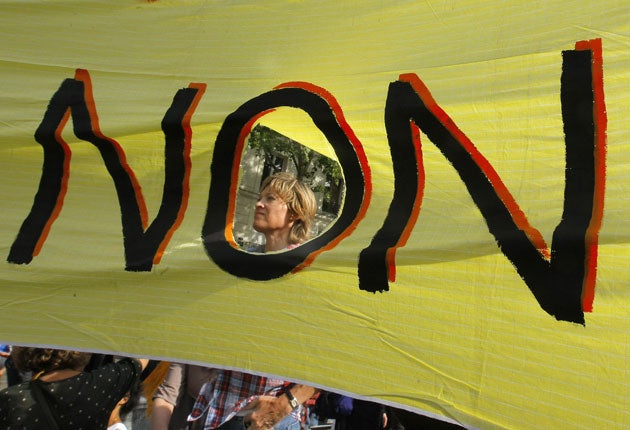John Lichfield: The French more relaxed about sex? It's a myth

Dominique Strauss-Kahn will never be President of the Republic but his political and social legacy is secure. He has shaken France more profoundly from his prison cell and gilded judicial exile in New York than he could possibly have achieved from within the Élysée Palace.
Three weeks after DSK's arrest, France is in culture-shock. The French are re-examining, painfully, two of their fondest beliefs about themselves. Fond belief number one: the French media and legal system have a healthier approach to the private lives of public figures than the prurient and puritanical "Anglo-Saxons". Fond belief number two: French men and women have much saner, and more relaxed, sexual relations than the uptight Anglo-Saxons, the frigid Germans or the silly Italians. The "affaire DSK" has left both fond beliefs in tatters.
Has the country's legally enforced policy of kiss and no tell concealed bad, even criminal, sexual behaviour by public figures? Quite possibly. But the pendulum has now lurched in the opposite direction. From failing to discuss what was widely known in the Paris media-political village (Strauss-Kahn's often aggressive and predatory behaviour towards women), France is now being confronted with tittle-tattle masquerading as truth.
A respected philosopher, and former education minister, Luc Ferry, implied on television this week that he had "evidence" that a former minister had been arrested during a paedophile orgy with small boys in Morocco. The scandal had, he said, been hushed up by the then French government. Which minister? Which French government? Mr Ferry did not say but he implied, self-importantly, that he had been given firsthand information about it by a "prime minister".
The French-language internet, including the websites of respectable news organisations, joyously guessed at the possible identity of the allegedly paedophile minister. All print editions, quite rightly, have refused to speculate and have attacked Mr Ferry. A preliminary criminal investigation was ordered by the French state prosecution service into a possible concealed crime. Mr Ferry was interviewed about what he knows by French police yesterday.
All the evidence suggests that Mr Ferry, a successful philosopher and failed politician, knows very little. He was repeating an often-repeated rumour, which had been investigated in the 1990s by the French media, in France and Morocco, and had proved to be groundless. He was just trying to make a point on a TV discussion programme or, as several French newspapers suggested, he was conducting a Cartesian experiment: "I am being talked about therefore I am."
And so to Fond Belief number two: "French men and women are more relaxed about sex, and about each other, than other nations (Brazil possibly excepted)." The "affaire DSK" has, it seems, broken a vow of silence among French women. Women's support groups report an increase of up to 600 per cent in calls from women who say that they have been sexually harassed or blackmailed at work.
Many of the incidents happened many years ago. The women were not necessarily seeking revenge or legal action. They just wanted to talk, for the first time, about what had happened to them. Women's groups say that the calls suggest that many – not all – French men in positions of authority regard female employees as a resource to be bullied, or blackmailed, or bribed into sexual submission.
Significantly, it was not Mr Strauss-Kahn's arrest on charges of attempted rape which dislodged this avalanche of female anger. It was the dismissive attitude of some male French politicians and political commentators to DSK's alleged crime. Many of the women said that they were moved to come forward when a Socialist friend of DSK talked of him as a "libertine" with an appetite for "pleasures of the flesh" or when a political journalist, and friend of Strauss-Kahn, spoke dismissively of the "troussage" (casual sexual abuse) of a maid. What angered them, they said, was not the allegations against DSK but what the comments had revealed about the arrogance and sense of impunity of French men.
As a representative of the frigid, uptight, prurient, puritanical rest-of-the-world, I should probably rejoice in the fact that the myth of the relaxed French attitude to sex has been skewered.
Some French men have undoubtedly exploited this myth to exploit French women. Sexual harassment has been more tolerated in France because the French like to believe that they take a relaxed view of sex. Similarly, the French media failed to distinguish between reporting on "private lives" and reporting on DSK's often offensive or aggressive attitude towards women.
And yet, my 14 years of observing the French, suggests to me that the myth of relaxed French sexuality is not entirely a myth. Many French people, both male and female, have a frank attitude to sex which is healthier than our sniggering obsessiveness.
There was support for this point of view from an unexpected quarter this week. French women's rights activists have long claimed that they take a more balanced and tolerant approach to male-female relations than the "politically correct" and "anti-male" approach of "Anglo-Saxon" feminists. In blogs and newspaper articles, American feminists are now accusing their "weak" French sisters of spawning male monsters by tolerating macho attitudes. In an article in Le Monde this week, the French sociologist, Irène Théry, defended féminisme à la Française. It was possible, she said, to demand equality for women while appreciating the "pleasures of consensual seduction and the delicious surprise of stolen kisses".
I would make a similar argument about French privacy laws. Public figures should be exposed if they behave badly. That does not mean that we always have a right to pry into the consensual love lives of public figures. Culture shock can be good, or bad. When the DSK affair subsides, it would be a pity if France learns the wrong lessons.
Join our commenting forum
Join thought-provoking conversations, follow other Independent readers and see their replies
Comments
Bookmark popover
Removed from bookmarks